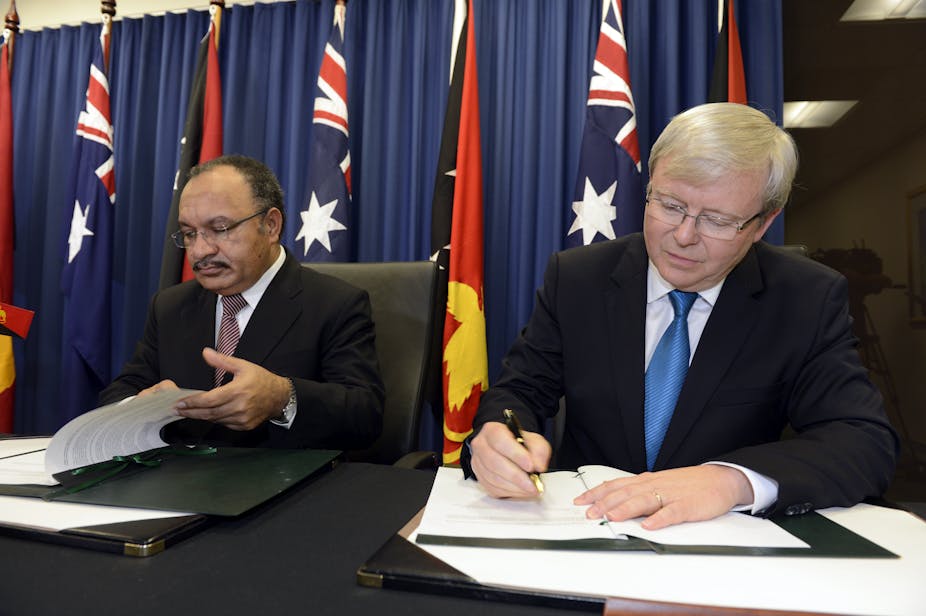Kevin Rudd has unveiled a dramatic new hard line policy to stop any asylum seekers arriving by boat ever being settled in Australia.
Australia and Papua New Guinea have signed an agreement for people arriving from now to be sent to PNG for processing. If found to be refugees they will be settled there.
“Arriving in Australia by boat will no longer mean settlement in Australia,” Rudd said.
But he admitted the arrivals would not stop overnight and things would be “bumpy and rocky for a while”.
The bilateral deal was announced by the Prime Minister in a joint news conference in Brisbane with his PNG counterpart Peter O'Neill.
There will be no limit on the number of people PNG takes, and Rudd gave no costing for the policy but did say it would be budget neutral.
Asylum seekers will be sent to Manus Island, which is set to be dramatically expanded, and elsewhere in PNG.
But facilities at Manus have recently been condemned by the UNHCR and for the moment women and children will not be sent there.
Rudd’s tough response to the huge increase in the inflow of boat people is an attempt to neutralise the issue ahead of the election.
He has adopted the hardest line possible to try to outflank the Coalition which has been campaigning hard and successfully on the issue over a long period.
But the strength of the deterrent will depend on how quickly people can be moved from Christmas Island to PNG. If the movement is not fast enough, the people smugglers will argue to their clients that the policy will not last and they still have a chance of eventually settling in Australia.
The cost of the new agreement is expected to run into billions of dollars, with Australia having to bear the expense of expanding processing and accommodation facilities, and covering their living and resettlement costs.
Australia is also promising a great deal of aid to PNG in areas including hospitals and law and order.
In another major development, which could greatly help to stop the flow of asylum seekers from Iran, Indonesia has agreed to tighten visa restrictions to visitors from Iran.
At the moment these visas can be bought cheaply at airports and many of these Iranians immediately seek to get on boats.
In the first few months of 2013 an estimated 6000 Iranians arrived in Indonesia. About 5000 Iranians have come to Australia by boat this year. The Indonesian visa decision could be as important as the PNG deal.
With boat arrivals probably the hottest single election issue, Opposition Leader Tony Abbott welcomed the “generous response” of PNG to Australia’s problem.
Abbott said this was a very promising development on offshore processing, but he did not see it stopping the boats.
“It will not work with Kevin Rudd in charge,” he said. Abbott said the big question for people was “who do you trust on this subject?”.
Rudd told the joint news conference: “I understand this is a very hardline decision. I understand the different groups in Australia and around the world will see this decision in different ways.
"But our responsibility as a government is to ensure we have a robust system of border security and orderly migration on the one hand as well as fulfilling our legal and compassionate obligations under the refugees convention on the other.”
Rudd said that the PNG measure was part of a range of initiatives. At a global level, he spoke today with the United Nations Secretary General and indicated that Australia will convene an international conference of transit countries and destination countries to discuss improving current international relations in two ways.
These were the adequacy of processing systems and centres around the world, and how arrangements could be improved for Australia, Canada, the US and other countries to deal with the resettlement issue.
Australia is also reviewing its own national assessment procedures for dealing with refugee determinations. The government has been flagging a tougher approach.
O'Neill said that PNG was blessed with “lots of land and a very small population” and was able to assist the Australian government in handling the refugee issue.
Rudd said that if the measures led to a significant reduction to people arriving by boat, the Australian government would consider progressively increasing its humanitarian intake towards 27,000 recommended by the Houston panel.
He said a full statement of cost would be put forward by Finance Minister Penny Wong “in due course”, adding that “we’ve gone through that quite extensively”.

